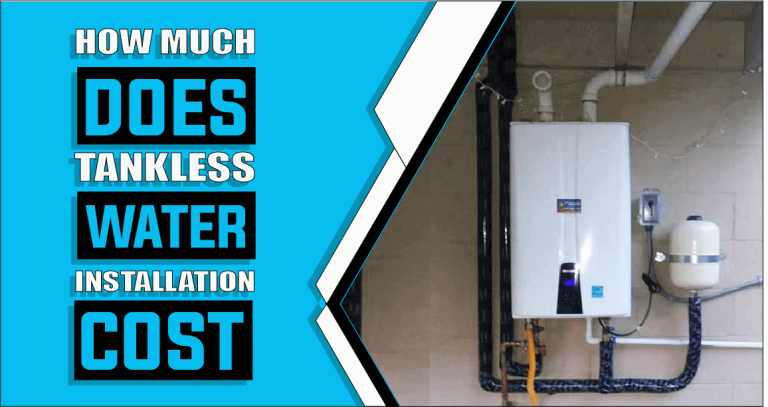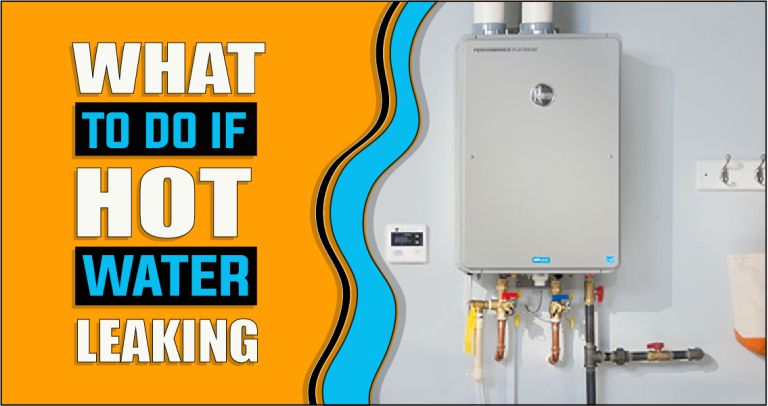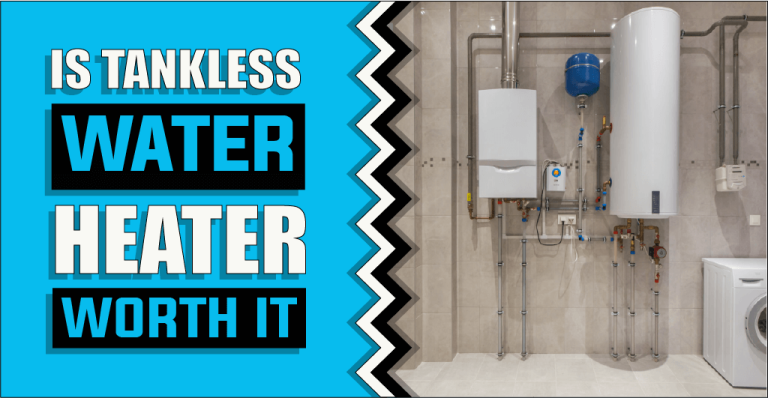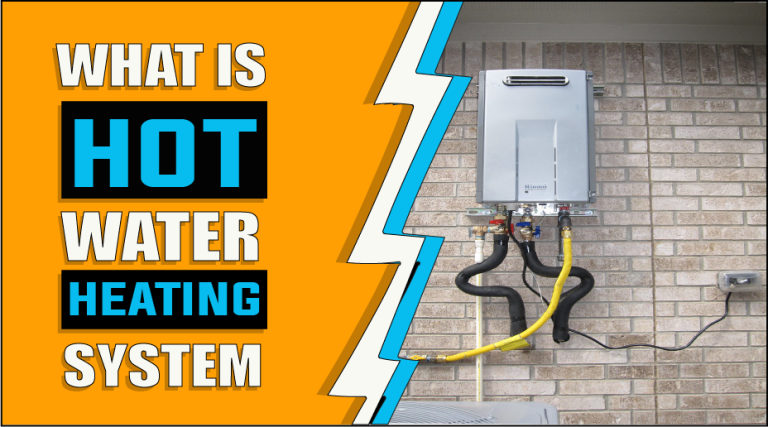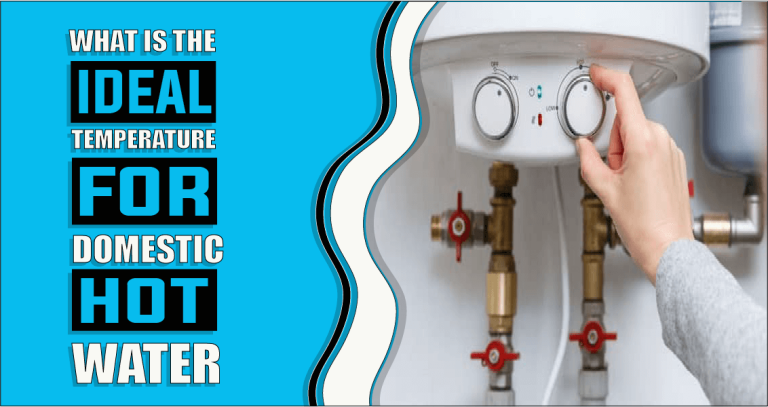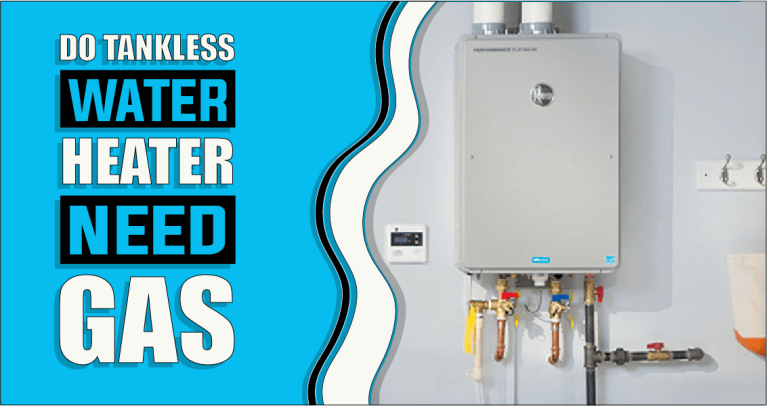Are Tankless Water Heaters Gas Or Electric – The Truth Reveals
As a homeowner, you have likely noticed the improved efficiency of modern water heaters. One popular option that is becoming more sought after is tankless water heaters, but there might be some confusion about are tankless water heaters gas or electric. It’s an important question to consider when shopping for a new water heater. The answer is that tankless water heaters can be electric or gas-powered, so you have the freedom to choose whichever type suits your needs best! Electric tankless water heaters are often the most popular option due to their convenience and versatile design and are inexpensive to operate in the long run. On the flip side, gas-powered tankless water heaters offer some unique benefits as well including a greater flow rate and higher energy efficiency. In this blog post, we’ll be exploring the differences between electric and gas tankless water heaters so that you can make an informed decision about which type is best for your needs. Whether you’re a homeowner looking to purchase a new heater for your home, this insight information provides all the answers you need. So read on, we look forward to delving into this interesting topic with you!
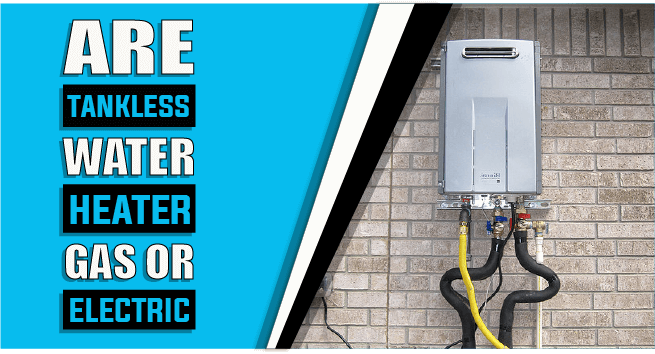
Let’s look are tankless water heaters are gas or electric.
Tankless water heaters are available in both gas and electric models. Gas tankless water heaters use natural gas or propane to heat the water, while electric tankless heaters use an electrical element inside the unit to provide hot water. Gas tankless water heaters are the most popular choice since they provide a continuous supply of hot water and can be installed outdoors with no additional venting required. Electric tankless water heaters are smaller and more compact than their natural gas counterparts, making them ideal for use in areas where space is limited. However, electric tankless models require more energy to produce the same amount of hot water as a natural gas heater, resulting in higher energy bills.
Both natural gas and electric tankless water heaters offer several benefits over traditional storage-tank heaters. They provide an endless supply of hot water on demand, using only the energy necessary to meet your current needs. This can result in considerable energy savings when compared to traditional storage tanks that need to reheat stored hot water even when it’s not being used. Additionally, tankless models are significantly smaller than traditional storage tanks and do not take up valuable floor space in the home. And because they do not contain any standing water, so they also require less maintenance than their counterparts which can help homeowners save money over time on repair and replacement costs.
Gas Tankless Water Heaters
Gas tankless water heaters are powered by natural gas or propane and can instantly provide hot water on demand. They do not require electric wiring or a storage tank, making them easier to install and maintain.
Pros of gas tankless water heaters:
Gas tankless water heaters offer several advantages over electric models. Let’s take a look at some of them:
1. Saves Energy and Money –
Gas tankless water heaters provide hot water on demand and only when it is needed, which saves energy and money. This results in lower utility bills and fewer CO2 emissions into the atmosphere.
2. Space Savings –
Gas tankless water heaters are much smaller than traditional tank models, which means they can be installed virtually anywhere in the home. This allows for more efficient use of existing spaces and frees up valuable storage space in your home.
3. Longer Lifespan –
Gas tankless water heaters last much longer than electric models. Since there is no need to constantly reheat stored water, they can last up to 20 years or more.
4: More Efficient:
They are more efficient than electric models, as they can produce hot water faster and at a lower cost.
5: Unlimited Hot Water:
Gas-powered tankless models also provide an unlimited supply of hot water on demand, making them ideal for households with multiple bathrooms and frequent usage during peak times.
Cons of gas tankless water heaters:
Although gas-powered tankless water heaters offer many advantages, there are some potential drawbacks to consider.
1: High Installation Cost:
Gas-powered models require a gas line to be installed, which can add to the overall installation cost. Additionally, professionals may also be required for electric wiring or plumbing installation.
2: Venting Requirement:
They do require venting to safely remove any exhaust gases generated during operation.
3: Maintenance Needs:
They also require regular maintenance; specifically, the air filter must be checked regularly and the anode rod should be replaced at least once per year.
The installation process of gas tankless water heaters
Installing a gas tankless water heater can be an intimidating task, but it doesn’t have to be. With the right preparation and knowledge, anyone can install their tankless water heater with ease.
1: Pick Right Location
Decide where your tankless water heater will be located. It is important to pick a location that allows for easy access for servicing and maintenance in the future. You’ll also need to make sure your chosen spot has adequate ventilation since tankless units require more airflow.
2: Connect All Components
It’s time to start connecting all the components. Begin by connecting the cold and hot water lines between your main plumbing system and your tankless unit. Make sure there are no leaks present in either connection. As potential leaks or loose connections could cause hazardous levels of carbon monoxide within your home or business environment.
3: Do Final Checks and Run The Unit
Check out that all connections are secure with an approved pressure gauge or thermometer attached to ensure everything is connected correctly for safety reasons. If everything checks out correctly you should be good to go with a gas tankless heater! Finally, follow all manufacturer instructions closely as this can greatly reduce chances for accidents or malfunction down the road due to misconfigurations or user error during the installation process.
Electric Tankless Water Heaters
Electric tankless water heaters are electric-powered devices that can instantly produce hot water on demand. The electric heater is connected directly to the power source and has no storage tank, allowing it to provide endless hot water without having to reheat a large amount of preheated stored water.
Pros of electric tankless water heaters:
Electric tankless water heaters offer a wide variety of benefits over traditional water heaters.
1. Savings on Energy Bills:
Electric tankless water heaters use less energy than traditional water heaters, making them more cost-effective over time. The reduced energy usage also helps reduce your carbon footprint.
2. Compact and Versatile:
Electric tankless water heaters are typically much smaller than traditional water heaters, making them ideal for use in tight spaces or homes with limited space. They can also be installed both indoors and outdoors and offer flexible installation options.
3. Great for Small or Busy Households:
If your home has a small water usage, then an electric tankless water heater may be the ideal choice. Since these units only heat up the amount of water that you need, they’re perfect for households with low hot water consumption. Additionally, if you have a busy household that uses multiple hot water devices simultaneously, an electric tankless water heater can provide enough hot water to service all devices.
4. Doesn’t Require Venting:
Installing electric tankless water heaters usually requires no additional venting work, making them easier to install and maintain.
5. Low Maintenance:
They also require less maintenance; usually, all that’s needed is to check the air filter and replace the anode rod occasionally.
Cons of electric tankless water heaters:
Although electric tankless water heaters offer many advantages, there are some potential disadvantages to consider.
1: High Upfront Cost:
Electric units tend to be more expensive than traditional tank-style water heaters due to the complexity of their design and installation requirements.
2: Professional Installation Service:
Since electric models require a dedicated power source, installation may require hiring electricians to handle the electric wiring.
The installation process of electric tankless water heaters
Installing an electric tankless water heater is a relatively simple job that can be done by a homeowner with some basic do-it-yourself experience and the right tools. Here are the steps to follow to ensure a successful installation of your electric tankless water heater:
1: Decide Installation Location
First, decide where the water heater will be installed. Typically, this is either on an outside wall or in an area near the intended point of use like a bathroom or kitchen sink. Make sure you have easy access to plumbing, electrical wiring, and gas lines before committing to a location.
2: Gather Necessary Tools
Second, gather all the necessary tools that you will need for the task ahead. This includes wrenches and other hand tools, safety glasses and gloves, drills, tape for sealing pipes and fittings, pipe cutters for cutting pipes if needed, and any additional items.
3: Turn Off Power Supply
Third, turn off both power and gas supplies going into your home as well as any active circuit breakers to ensure that no electricity will be flowing while you are working with electrical wiring.
4: Install Mounting Brackets
Fourth, install the mounting brackets for the new tankless water heater onto the appropriate wall or surface following manufacturer instructions. Carefully measure twice before drilling any holes so that everything is set up correctly from the start. Securely attach all mounting brackets in place using bolts or screws depending on what type of surface you are working with. Be aware of any nearby studs or wall joists as well when securing mounting brackets into place.
5: Connect Plumbing Lines
Fifth, connect plumbing lines from existing systems to piping on tankless water heaters according to manufacturer recommendations. Check all connections once more before proceeding further in case something needs tightening or replacing entirely due to damage during the installation process.
6: Connect Electrical Wires
Sixth, connect electrical wires from the breaker box to terminals located on the tankless water heater’s housing according to the manufacturer’s directions being mindful not to leave them exposed as this can cause serious injury upon powering up the device after installation is complete; make sure they are securely fastened as well as double checking all connections once more.
7: Turn On Power Supply To Heater
Lastly, once all wires, pipes, and mounting brackets are in place, turn on the power supply to start heating your home’s water. Test out the electric tankless water heater a few times before using it regularly just to be sure everything is working properly.
Gas Vs Electric Tankless Water Heaters; Key Distinctions
When it comes to electric versus gas tankless water heaters, several key distinctions can help you make the best decision for your home. Here’s a quick rundown of the differences between electric and gas tankless water heaters:
- Fuel Source
Gas tankless water heaters use natural gas to create heat for the water, while electric models typically draw electricity from a power source.
- Energy Efficiency
Gas tankless water heaters are much more energy efficient than electric models. This is because they have a higher energy output and less energy is lost in the process of heating the water. Electric models can lose energy to heat the water, which can cause them to be less efficient over time.
- Cost Efficiency
When looking at cost efficiency, gas tankless water heaters are generally going to be cheaper than electric models due to their lower fuel costs and higher efficiency rates. However, electric models may be slightly cheaper for smaller households if upfront installation costs are taken into account.
- Unit Cost
The cost of a gas tankless heater may vary depending on the size and features included but generally speaking, they are going to cost significantly less upfront than electric models with similar features and sizes.
- Venting Requirements
Gas models require more complex ventilation systems due to the number of combustion gases they produce during operation while electric models do not require this additional venting.
- Installation Cost
Installing a gas model will likely be more expensive due to additional components required such as vent pipes and additional plumbing connections necessary for proper installation. On the other hand, installing an electric model requires fewer components meaning less labor and overall expense.
- Maintenance
Maintenance requirements between both types depend largely on how often you use your unit and how well you keep up with basic maintenance tasks such as checking air filters or flushing out sediment buildup inside your unit every few months. That said, gas units may require more frequent maintenance to ensure safe operation, making them potentially more costly over time.
- Flow Rate Capacity
A standard-sized residential gas tankless heater should provide approximately 2-3 gallons per minute (GPM) whereas an average-sized residential electric heater should provide around 1-2 GPM, depending on how much hot water you need at once!
- Environmental Impact
Both types of tankless water heaters are relatively environmentally friendly compared with traditional storage tanks since there is no standing reservoir, meaning no standby loss! Gas units emit small amounts of carbon dioxide (CO2) during operation while electric ones emit virtually none at all.
Frequently Asked Questions
No, tankless water heaters can either be electric or gas-powered. Electric models require electricity as a power source while gas models use natural gas to create heat for the water.
Yes, gas tankless water heaters use natural gas for heating the water. They are much more energy efficient than electric models due to their higher energy output and less energy is lost in the process.
Yes, electric tankless water heaters are powered by electricity and do not require gas for operation. Electric models typically draw electricity from a power source to heat the water.
Electric tankless water heaters may result in higher electricity costs depending on the unit size, features, and how long it is used. Gas models are typically more cost-efficient due to their lower fuel costs and higher efficiency rates.
It depends on the size and features of your electric tankless water heater, as well as the cost of electricity in your area. Electric models may be slightly cheaper. However, gas models tend to be more cost-efficient due to their lower fuel costs and higher efficiency rates.
The best electric or gas tankless water heater will depend on your specific needs and budget. Generally, gas tankless water heaters are more energy-efficient and cost-effective than electric models but electric models may be slightly cheaper for smaller households if upfront installation costs are taken into account.
Conclusion
We hope you have found this article helpful in answering the question: Are tankless water heaters gas or electric? The tankless water heaters are both gas and electric! Gas models are typically more energy-efficient and cost-effective in the long run. On the other hand, electric tankless water heaters provide a more cost-effective solution upfront and require fewer components to install. Ultimately, the best electric or gas tankless water heater for you will depend on your specific needs and budget. Whether you decide to go electric or gas, investing in a tankless water heater can help reduce your energy costs over time as well as cut down on wasted hot water. No matter which type of tankless water heater you choose, you’ll be able to enjoy an endless supply of hot water without having to worry about running out!
Ella John is passionate about helping her readers make the best choice when purchasing a heater. She understands that selecting a heater can be difficult and strives to provide information to help make the decision easier. Ella’s website, Heatersinfo.com, provides valuable insight into heating trends and types of heaters and tips on how to care for them. She also advises selecting the right heater based on individual needs and preferences. Her expertise in electronics makes her an excellent source of knowledge, and she is confident that anyone who visits her website will find the perfect heater information for their needs. Ella’s dedication to helping others make educated decisions about buying the right heater is unparalleled, and she hopes to continue offering her expertise for many years. With Ella’s help, finding the perfect heater can be a breeze!

